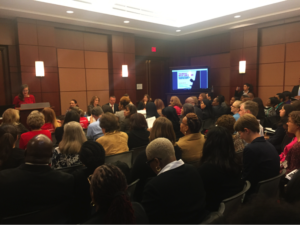Washington, DC – Today, the House Judiciary Committee held a hearing at 10:00 AM EST concerning online sex trafficking and the Communications Decency Act (CDA). For years, the courts have interpreted Section 230 of the CDA as granting broad immunity to websites such as Backpage.com and others that publish third-party content and facilitate sex trafficking from any criminal liability.
“Major tech companies have supported Backpage.com in the courts and lobbied against amending the CDA in Congress for fear of hypothetical frivolous lawsuits—what one judge called ‘death by ten thousand duck bites.’ But children, women, and men are actually being bought and sold online every day. There’s nothing hypothetical about their sexual exploitation,” said Lisa Thompson, Vice President of the National Center on Sexual Exploitation.
She added, “Conspicuously missing from today’s hearing are trafficking victims themselves whose serial rape and sexual slavery were made possible by the likes of Backpage.com and other similar websites. The factual testimonies of sex trafficking victims and their families ought to carry more weight in Congress than any consideration of hypothetical, frivolous lawsuits the tech industry so melodramatically fears. We’ve yet to see if these so-called ducks bite, but victims of online sex trafficking are proof that sex traffickers do.”

“The National Center on Missing and Exploited Children has reported a staggering 846% increase in reports of suspected child sex trafficking to its CyberTipline in recent years. In light of the tech lobby’s overwrought concerns about litigation, it is important to note that the legislative fixes being advanced in Congress are narrowly tailored to address the issue of online sex trafficking in order to protect good online actors from frivolous litigation.”
Even so, the tech community is unrelentingly and vociferously opposing efforts to ensure that interactive computer service providers that facilitate sex trafficking are brought to justice. Consumer Watchdog released a detailed report on this issue entitled How Google’s Backing of Backpage Protects Child Sex Trafficking, and GoogleTransparencyProject.com also sheds light on the connection between Google and Backpage.com.
Tackling the problem head on, U.S. Representative Ann Wagner has proposed a strong legislative remedy to this scourge—the bipartisan Allow States and Victims to Fight Online Sex Trafficking Act of 2017.
Despite concerted opposition from the titans of tech and their allies, there is a groundswell of support for both House and Senate efforts to amend the CDA from a diverse range of entities, including tech giant Oracle, nearly 100 non-governmental organizations, 35 United States Senators, and more than 150 members of the U.S. House of Representatives.
This was further evidenced by the turnout at an event hosted yesterday by the National Center on Sexual Exploitation entitled: “The Crisis of Digital Slave Auctions: How Congress Can Fight Online Sex Trafficking by Amending the Communications Decency Act.” Video from the event will be uploaded here.
Representative Ann Wagner addressed and stated, “It’s heartbreaking to watch survivors struggle to piece their lives back together alone, while our so-called justice system shields the websites that sold them. In April, I introduced the Allow States and Victims to Fight Online Sex Trafficking Act (FOSTA), which now has 150 cosponsors. This bill narrowly amends Section 230 to ensure that websites profiting from sex trafficking do not have legal immunity. It’s time for Congress to protect victims, not the multi-million dollar online businesses that sell the most vulnerable members of our community.”






